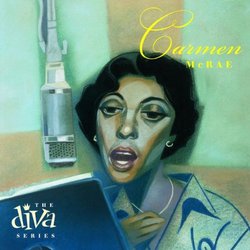A Diva Who Not Only Knew How to Use Her Voice But Had a Gorg
Samuel Chell | Kenosha,, WI United States | 02/27/2008
(5 out of 5 stars)
"I came to jazz after Billie's death and just as Nancy Wilson was beginning to make her mark--at a time when the top 3 divas in jazz (as supported by fans and critics polls) were consistently Ella, Sarah and Carmen, from 1 to 3. Carmen made her appearance slightly after the other two, beginning with strings-plus-vocal dates that were the order of the day, before a breakout jazz set--"Live at Sugar Hill"--in the early '60s. Many listeners, Carmen fans among them, don't realize what a complete singer she once was--possessing not only the interpretive gifts of a great actress but a nearly equally impressive voice. This collection is valuable if only because it sets the record straight, revealing a Carmen McRae before she started showing the effects of a tobacco addiction.
She was always rightfully recognized as one of the top 3-4 jazz singers and interpreters of the American Songbook, but by the early '70s her once-lovely soprano (and song keys) had dropped considerably, and she lacked the breath support that once allowed her to draw out a phrase, finishing it off with a warm, glowing vibrato (the vibrato would desert her, and her voice began to evidence little to no "body" when she sang softly). Give credit to the interpretive abilities and all-around musicianship that enabled her to "work around" if not hide the harmful effects of smoking. On this recording, you're able to hear both strengths of Carmen--her ability to deliver a lyric convincingly and the stirring and seductive vocal quality that perhaps many listeners are unaware of.
A revealing contrast is her performance of "Any Old Time" (composed by Artie Shaw for Billie Holiday) on this occasion with the performance of the same tune almost 30 years later (mid to late 80s) on a disc of the same title. Both are excellent, though the later recording requires her to "punch" individual notes and work more carefully with her rhythm section. As for "All the Things You Are," which she handles here with the required sustained legatos along with dramatic phrasing and incisive articulations, that's a number that would be out of reach for her by the mid 70s.
In all fairness, perhaps the "dirty habit" doesn't deserve all the blame. Ella's voice began to wobble in the '70s, and Sarah (also a smoker), though she retained her formidable range, employed an artificial, faux-opera falsetto to attain the heights she formerly had reached without strain or artifice. Not all but perhaps most vocalists are like vintage wine, and a listener is best advised to attend to time periods as much as the singer before expressing a preference or judgment about the artist. Don't take the ratings at All-Music Guide too seriously. Pick up "Live at Sugar Hill" or "Boy Meets Girl" with Carmen and Sammy Davis Jr. (who's delightful as a foil to Carmen and absolutely dominating as a soloist on the "Porgy and Bess" numbers). "Carmen McRae Sings The American Songbook" from the early seventies is a swinging live set by Carmen, sparked by the guitar of Joe Pass, but the voice is not the radiant, vibrant one we hear on McRae circa 1950 and 1960. Of her late recordings, "Any Old Time" (which includes tenor giant Clifford Jordan) is, in my opinion, the most consistently satisfying, though her even later tribute to Sarah Vaughan is more successful than I had anticipated, with no small amount of credit due to the supportive piano accompaniment of Shirley Horn."


 Track Listings (16) - Disc #1
Track Listings (16) - Disc #1